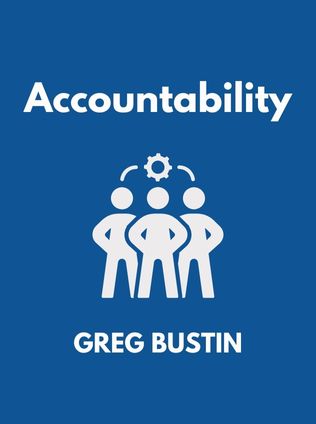
Accountability
The Key to Driving a High-Performance Culture
By Greg Bustin
Published 03/2014
About the Author
Greg Bustin is a distinguished business and leadership consultant, an international speaker, and a Master Chair for Vistage International, the world's largest CEO membership organization. He writes a monthly bulletin read by over 5,000 executives globally and frequently speaks at events worldwide. Bustin's insights on leadership have been featured in major publications such as the Wall Street Journal, Barron's, and the Dallas Morning News.
Main Idea
Accountability: The Key to Driving a High-Performance Culture by Greg Bustin addresses one of the most significant challenges leaders face: accountability. Bustin presents a set of leadership tools designed to enhance accountability and drive success within any organization. He introduces the Seven Pillars of Accountability—character, unity, learning, tracking, urgency, reputation, and evolution—as essential components for creating and sustaining a high-performance culture.
Table of Contents
- Introduction
- Accountability Starts with Purpose
- Learning from Winners
- The Seven Pillars of Accountability
- Character Counts
- Galvanizing Your Team: Unity
- Green and Growing: Learning
- What Your Employees Want: Tracking
- Instilling a Sense of Urgency
- Walking the Talk: Reputation
- Change Practices, Not Principles: Evolving
Introduction
Bustin begins by highlighting the importance of clear expectations, immediate action on problems, and the necessity of separating emotions from facts when holding people accountable. He asserts that avoiding difficult conversations and making excuses are detrimental to building a culture of accountability. Successful organizations, such as The Container Store and Southwest Airlines, integrate accountability into every aspect of their operations, from hiring to decision-making.
Accountability Starts with Purpose
Before leaders can hold others accountable, they must first hold themselves accountable by understanding their purpose. Bustin emphasizes the importance of self-awareness and aligning personal goals with professional aspirations. Leaders must define their values and live by them to establish a foundation for accountability within their organizations.
"Who do you want to be that causes you to do what you do?" - Greg Bustin
integrating purpose into leadership:
- Articulating clear, measurable goals for personal and professional growth
- Ensuring that business activities align with core values and long-term objectives
- Reflecting regularly on personal fulfillment and career satisfaction
Learning from Winners
Bustin discusses the importance of moving from Point A to Point B, stressing that accountability is crucial in this journey. He uses the metaphor of a funnel to explain how time, talent, and resources flow through an organization, and how emotions can create chokepoints that hinder progress. To overcome these challenges, leaders must develop a clear plan, communicate effectively, and ensure that all team members are committed to the vision.
"People are more likely to support a plan they helped develop." - Greg Bustin
effective planning and execution:
- Involving team members in the development of strategic plans
- Setting clear objectives, strategies, budgets, responsibilities, and schedules
- Addressing issues and making necessary changes to improve performance
The Seven Pillars of Accountability
Character
An organization's character is defined by its values and how they are lived out in daily operations. Leaders must hire individuals who share these values and create systems that reflect the organization's commitment to doing what is right, even when it is difficult.
"Our actions are the outward expression of our character." - Greg Bustin
reinforcing character in an organization:
Sign up for FREE and get access to 1,400+ books summaries.
You May Also Like
The Subtle Art of Not Giving a F*ck
A Counterintuitive Approach to Living a Good Life
By Mark MansonRich Dad Poor Dad
What the Rich Teach Their Kids About Money - That the Poor and Middle Class Do Not!
By Robert T. KiyosakiHow To Win Friends and Influence People
The All-Time Classic Manual Of People Skills
By Dale CarnegieQuiet: The Power of Introverts
The Power of Introverts in a World That Can't Stop Talking
By Susan Cain



















